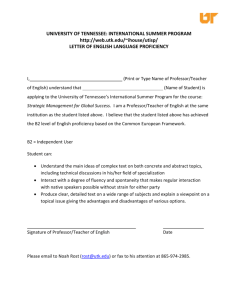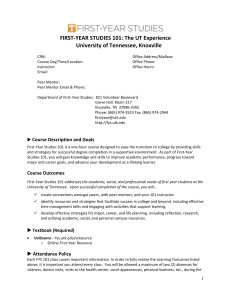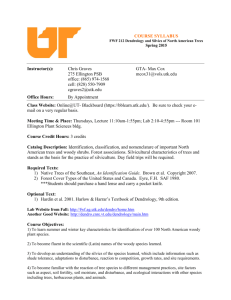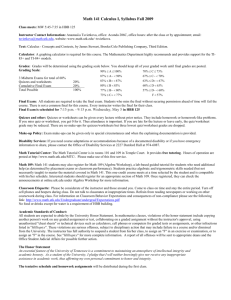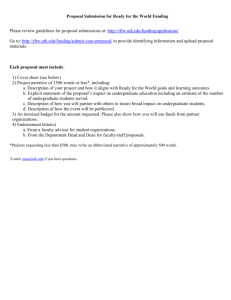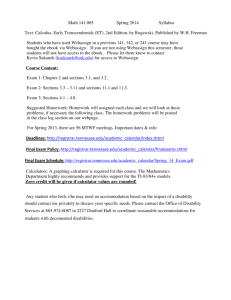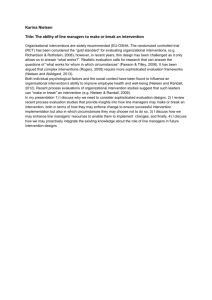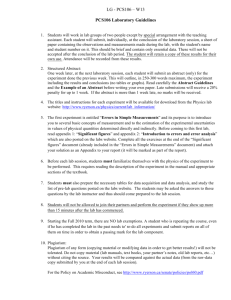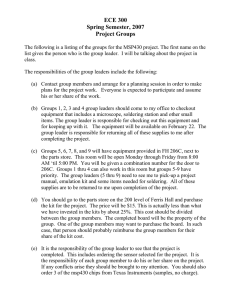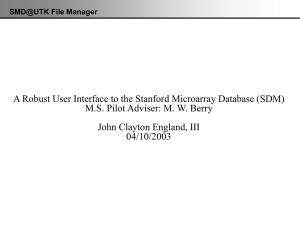Physics 231, Section 006 - University of Tennessee Department of
advertisement
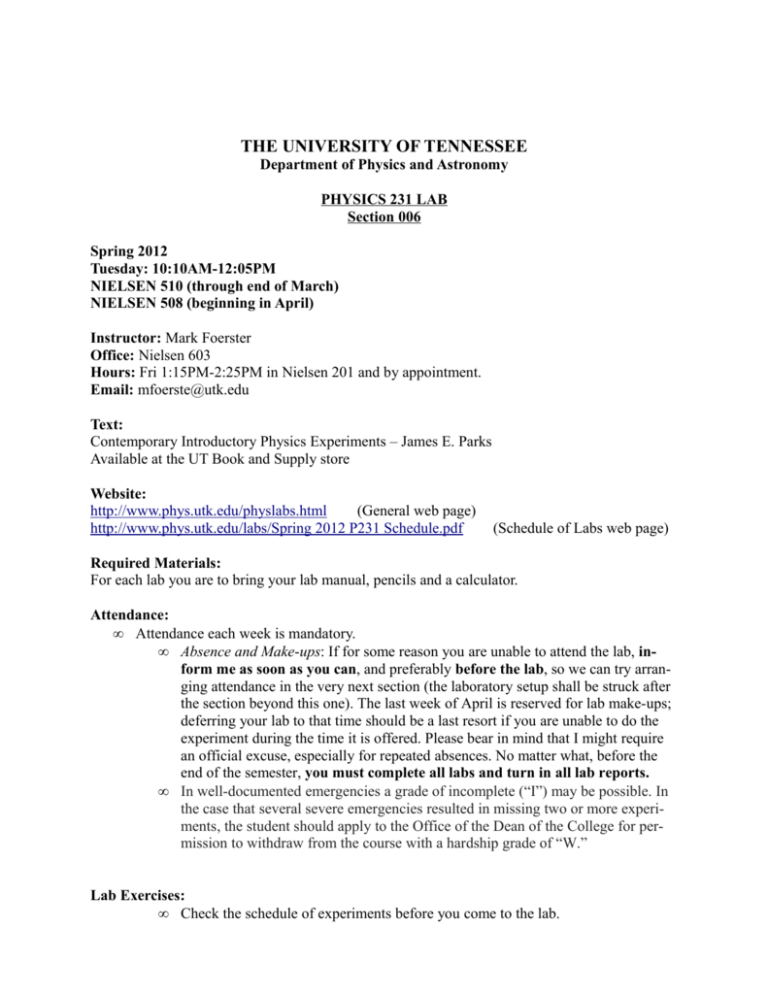
THE UNIVERSITY OF TENNESSEE Department of Physics and Astronomy PHYSICS 231 LAB Section 006 Spring 2012 Tuesday: 10:10AM-12:05PM NIELSEN 510 (through end of March) NIELSEN 508 (beginning in April) Instructor: Mark Foerster Office: Nielsen 603 Hours: Fri 1:15PM-2:25PM in Nielsen 201 and by appointment. Email: mfoerste@utk.edu Text: Contemporary Introductory Physics Experiments – James E. Parks Available at the UT Book and Supply store Website: http://www.phys.utk.edu/physlabs.html (General web page) http://www.phys.utk.edu/labs/Spring 2012 P231 Schedule.pdf (Schedule of Labs web page) Required Materials: For each lab you are to bring your lab manual, pencils and a calculator. Attendance: • Attendance each week is mandatory. • Absence and Make-ups: If for some reason you are unable to attend the lab, inform me as soon as you can, and preferably before the lab, so we can try arranging attendance in the very next section (the laboratory setup shall be struck after the section beyond this one). The last week of April is reserved for lab make-ups; deferring your lab to that time should be a last resort if you are unable to do the experiment during the time it is offered. Please bear in mind that I might require an official excuse, especially for repeated absences. No matter what, before the end of the semester, you must complete all labs and turn in all lab reports. • In well-documented emergencies a grade of incomplete (“I”) may be possible. In the case that several severe emergencies resulted in missing two or more experiments, the student should apply to the Office of the Dean of the College for permission to withdraw from the course with a hardship grade of “W.” Lab Exercises: • Check the schedule of experiments before you come to the lab. • • • • • • • • Read the lab exercise before coming to the lab. That way, you can get right to work on doing the experiment(s) and recording your data. This will reduce the risk that you run out of time and have to rush at the end. If you finish experimenting and collecting data early, use the remaining time to jump-start your analysis and lab report. Lab reports are to be turned in at the beginning of the next lab session. Graded lab reports shall be returned at the beginning of the lab session after that. Failure to do so will mean a zero for that lab session. Lab Partners: Pair up with a partner for experiments. Each student is required to maintain their own data sheet(s) and to write up their own lab report from it. Each report must list the experiment partner(s) that were worked-with. Guidelines for writing your lab reports are extensively detailed in item 4 of the Teaching Assistant Manual, pp. 10 – 12. This is available on the department web site at http://www.phys.utk.edu/tamanual.pdf Grading: The lab grade, which makes up 20% of the overall course grade, is divided up as follows: • In-class participation and Lab reports - 90% • Lab Final Exam - 10% Each Lab Report is graded on a ten point scale. Grading Scale: A ≥ 90, B+ ≥ 85, B ≥ 80, C+ ≥ 75, C ≥ 70, D ≥ 60, and F < 60. Plagiarism and the Honor Statement: Academic dishonesty/plagiarism is commonly defined as passing off someone else's words, writings, ideas, etc. as one's own. Plagiarism is tantamount to lying and stealing. In order to avoid plagiarism, properly credit material drawn from other sources. Rules against cheating apply to homework, papers, and attendance sign-in as well as tests. If you plagiarize, you will fail this course and suffer other penalties. You must agree to abide by the UT honor statement: “An essential feature of the University of Tennessee is a commitment to maintaining an atmosphere of intellectual integrity and academic honesty. As a student of the University, I pledge that I will neither knowingly give nor receive any inappropriate assistance in academic work, thus affirming my own personal commitment to honor and integrity.” For full information, see http://dos.utk.edu/files/hilltopics_10_11.pdf The preceding paragraph comes from the syllabus of Jamie Todhunter (jtodhun1@utk.edu) for his class of POLS 370 for the Fall 2011 semester. Students with Disabilities: Students who have a disability that requires accommodation(s) should make an appointment with the Office of Disability Services at 865-974-6087 to discuss their specific needs. For full information, see http://ods.utk.edu. As teaching assistant, I reserve the right to revise and re-post any aspect of the syllabus as needed. Hopefully it will be limited to correcting typos and making clarifications. Physics 231 Laboratory Schedule of Experiments Spring 2012 Semester Dates 11-Jan 16-Jan – 17-Jan 23-Jan – 24-Jan 30-Jan – 31-Jan 6-Feb – 7-Feb 13-Feb – 14-Feb 20-Feb – 21-Feb 27-Feb – 28-Feb 5-Mar – 6-Mar 12-Mar – 13-Mar 19-Mar – 20-Mar 26-Mar – 27-Mar 2-Apr – 3-Apr 9-Apr – 10-Apr 16-Apr – 17-Apr 23-Apr – 24-Apr 27-Apr 30-Apr Nielsen Room # 510 510 510 510 510 510 510 510 510 508 508 508 508 Experiment Classes Begin No Labs–January 16 MLK Holiday Electric Fields Ohm’s Law I & II Ohm’s Law I & II cont’d Wheatstone Bridge Resistance vs. Temperature Electrical Energy e/m Ratio Ampere’s Law Spring Break - March 19-23 - No Labs Oscilloscope RC & RL Circuits AC Circuits I AC Circuits II Lab Makeups/Lab Final Exam Last Day of Classes Study Period The laboratory manual for Physics 231 is Contemporary Introductory Physics Experiments by James E. Parks, Hayden-McNeil Publishing, ISBN 978-0-7380-3083-8 and is available at the UT Book and Supply Store.
